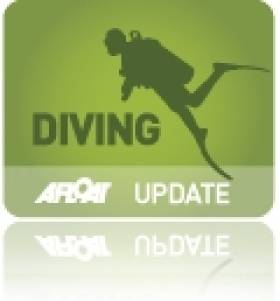Displaying items by tag: WrecK Diving
Irish Diver At Home In The Philippines
#Diving - The Daily Inquirer in the Philippines turns the spotlight on Irish diver David Joyce, who together with British business partner Matt Reed runs the Evolution diving school in northern Cebu which specialises in technical dives such as wreck explorations, and more recently the recovery of a downed aircraft.
A former TV producer and director, Joyce tells how he met Reed during a holiday in the Philippines in 2008 and suggested the idea of setting up shop in the country together.
Five years on and the pair now employ 24 people across 10 properties, training locals and tourists alike in the more technical aspects of diving, going deeper with more specialised equipment.
“Everything has to be calculated," says Joyce. "When you return to the surface, it has to be slow taking 90 minutes to two hours or 3 meters per minute).
You have to be prepared—four tanks containing different gases, regulators and rebreather units have to be on standby."
Aside from their particular interest in wreck dives - including the discovery of what might be the wreck of the MV Pioneer Cebu, which sank in 1966 with 262 passengers aboard - the duo are dedicated to preserving the natural resources of their tropical island paradise.
That involves working with the local coastguard to prevent destruction of delicate coral reefs and the decline of the catch for local fishermen.
The Daily Inquirer has much more on the story HERE.
There Is More To The Water Underneath
My time on the water has been spent 'on the surface,' but those who like to go underwater tell me the attractions of diving are magnificent and that Cork Harbour, my sailing base atop the water, is one of the great 'dive spots' on the Irish coastline.
There are many ways to enjoy the water, so I believe in encouraging everyone who takes parts in watersports. That is one way in which appreciation of the importance of the marine sphere can be advanced.
The Irish Underwater Council, Comhairle Fó Thuinn, known by its initials 'CFT,' promotes diving and is the national governing body for recreational underwater sports in Ireland. Through affiliated clubs, it provides training for diving and snorkelling.

"It's time to dive," the CFT says. "We provide the opportunity for recreation and fun in a friendly environment while maintaining a safe and cautious attitude to Irish waters. The basic objective of the training system is to demonstrate, teach and practice all the necessary abilities until the beginner is comfortable with the equipment and basic safety skills. There is no pressure of time limits and training is at the individual's own pace."
The CFT was founded in 1963 when underwater enthusiasts wanted to establish a national group which would organise and promote sport scuba diving and snorkelling. At that time there were six clubs around the country. The number has now expanded to 84.
I was talking in the past week to just one of those clubs - the Cork Sub Aqua Club which is encouraging more people to take up the sport. It has been in existence for 40 years and organises dives on Wednesday evenings during the Summer and on most Sundays throughout the year. There are visits to dive sites outside of Cork and wreck-diving is organised to suit ability and experience. Divers come from all ages and backgrounds, so there is a great opportunity if for anyone interested to get involved.
"We will begin training new recruits in January, so anyone who joins will be ready for open water by the Spring. No experience is necessary," the club says. "Our qualified instructors are waiting for newcomers and, for anyone already qualified, we say join and dive with us."
The photograph on this week's blog shows two divers enjoying their time in the water, even in this cold period of the year. Niall O'Regan from Monkstown in Cork and Ian Kelleher were diving off Roche's Point. They had a look at a trawler which sank in the area back in the mid-80s. The attraction of diving for them is "the great diversity of sea life to be found around the harbour and the quiet and tranquillity underwater in comparison to the hustle and bustle on land." That is a well-expressed sentiment which I like and encourages me to tell you that I am continuing with attempt to develop my idea for the establishment of an Irish maritime foundation. My thanks to those readers of this blog who Emailed me about it. Some good ideas have been put forward and more are always welcome.
For anyone interested you can get more information about the Irish Underwater Council by Emailing: [email protected] or about membership by Email to: [email protected]
You can Email me in response to items on this blog at: [email protected]
This article is reprinted by permission of the EVENING ECHO newspaper, Cork, where Tom MacSweeney writes maritime columns twice weekly. Evening Echo website: www.eecho.ie
























































